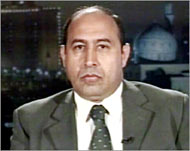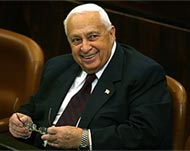Iraqi officials ban Aljazeera
Iraq’s US-installed interim Governing Council has prohibited Aljazeera from covering its activities for one month.

“Aljazeera was forbidden from covering from January 28 to February 27,” the channel’s Baghdad bureau chief, Abd al-Haq Saddah said on Saturday.
“We wanted to attend the press conference by (current council president Adnan) Pachachi today but we were stopped at the door,” he said.
“The decision was then faxed to our headquarters in Doha,” Saddah said, adding that the Governing Council took its decision based on the station’s programme “Opposite Direction”, which it said had criticised the interim government.
During the press conference, Pachachi said Aljazeera had broadcast a “provocative programme in which one of its participants was very excessive (in their remarks) and made accusations against certain council members.”
‘Israel’s infiltration into Iraq’
The programme, aired on 27 January 2004, focused on “Israel’s infiltration into Iraq” and featured panelists, Dr Nur al-Muradi, the spokesman for the Iraqi Communist Party and Hamid al-Kafaiee, the spokesman for the Iraqi Governing Council (IGC).
 |
|
Hamid al-Kafaiee was also a |
The discussion, the channel said, raised issues such as “Israel’s ambitions in Iraq, accusations directed against some Iraqi political leaders of spying in favour of Israel and the role of Israel in the invasion of Iraq”.
Al-Muradi said “Israeli infiltration into Iraq, was no exaggeration, but the truth”. According to al-Muradi, there was, “since 1902, a project of settlement of one million Jews in Iraq but after the Balfour declaration, the project of settlement in Palestine became de facto where Jews emigrated from Iraq to Palestine”.
He said “the infiltration (into Iraq by Israel) began from three areas: economical, military and the political powers”.
Al-Muradi also accused some members of the IGC of co-operation with Israelis. “You must not be astonished”, he said “if you saw (Ariel) Sharon wandering in the streets of Kurdistan”.
Sharon ‘in Iraq’
On 14 December 2003, al-Muradi said, “Sharon was in Baghdad attending one of the hearing sessions of captured Saddam Hussein”. He accused Kafaiee of “knowing about that”.
 |
|
Aljazeera panelist claimed Sharon |
“The political infiltration was carried out through four key areas”, said al-Muradi.
“That is, the Kurdish movement, the IGC, the family of the late Sayed Muhsin al-Hakim (predecessor to Shia leader Ayat Allah Ali al-Sistani) and the apostates in the Iraqi Communist Party”.
Al-Muradi presented pictures from a book titled The Mossad in Iraq in which he confirmed the past cooperation between top Jewish and Kurdish leaders that dates back to 1968.
Mossad
 |
|
Ahmad al-Chalabi allegedly visited |
The Iraqi Communist Party spokesman also, in the television discussion, referred to the book authored by Jewish writer Shlomo Nakdimon in which he referred to the military cooperation between the Kurdish leaders like Mula Mustafa al-Barazani, the father of Masud al-Barazani, a member of the IGC. The author said Mustafa al-Barazani was a general in the Israeli army.
Al-Muradi also drew attention to some members of the IGC, such as Ahmad al-Chalabi, whom he claimed “had visited Israel many times and met Ifraim Halivi, the head of Israel’s National Security Council”.
“Mossad bought lands in the northern Iraqi city of Zawita, so it controlled (cross-border) trade taking place in the (thoroughfare) town of al-Khalil”.
Channels banned
On 23 September, the Governing Council banned both Aljazeera and the Dubai-based al-Arabiya from covering government activities for two weeks for allegedly inciting anti-US violence.
Al-Arabiya also suffered through a two-month ban that was lifted only on Wednesday for airing an audio-taped message from ousted Iraqi president Saddam Hussein calling for attacks on the Governing Council.
Launched in 1996, Aljazeera has attracted international attention through its coverage of the US military campaign in Afghanistan and broadcasting videotaped statements of al-Qaida leader Usama bin Ladin.
Aljazeera also broadcast audiotapes by Saddam Hussein before his capture in December by US forces.